Hi Sweet Friends,
Well, it’s late January, so I’m guessing that more than a few of you have slipped on your New Year’s resolutions (me too!). First of all—no biggie. If the goals you made while ringing in 2014 are still important to you, keep moving toward them one step at a time. Turtle power! But if you haven’t pinpointed what you want to do to improve your health, you’re not alone. Many of my readers are overwhelmed.
I get this question almost daily, “There are so many healthy habits to choose from—which one should I tackle first?”
Translation: What will make the biggest difference in my health TODAY.
Of course, green juices and smoothies are my numero uno recommendation, but second is always… dumping dairy. That’s right, go dairy-free.
You’re gonna learn a lot about dairy in a minute, but here are a few of the main reasons I removed it from my diet. Dairy is high in saturated fat (which can lead to stroke and heart attacks), it’s highly inflammatory (the root cause of many chronic diseases), and the growth hormones in dairy (ex. IGF1) can stimulate malignant cell growth and proliferation (because I have cancer, that’s a big NO thanks!). I know from personal experience, and from thousands of emails, Facebook comments, and tweets, that saying adieu to dairy can totally transform your health. So even if you’re not keen on ditching your milkshakes and brie today, I invite you to learn a little more about this bovine beverage. Even lessening the amount of dairy you consume can make a difference in how you feel.
How Dairy Impact Your Health
(excerpted & updated from Crazy Sexy Diet and Crazy Sexy Kitchen)
A cow drinks cow’s milk when it’s a baby. A bunny drinks bunny’s milk when it’s a baby. Beyond a certain age, even they know that it’s freaky to suckle. And do you ever see them switch and swap? The only time milk is essential for good health is when we are babies, being breastfed by human mothers. Human breast milk is nature’s perfect formula for human babies. It’s rich in good fats like DHA for brain development, but it’s relatively low in protein. Cow’s milk contains more than three times as much protein as breast milk. That’s because baby cows need a lot more protein. They grow to between 1,500 and 2,000 pounds. Is that your desired weight? If so, hello reality TV!
While the protein in human milk is designed for human bodies, much of the protein in cow’s milk is difficult for humans to digest.
In addition, the over-consumption of this protein can lead to serious health conditions. Dr. T. Colin Campbell, professor emeritus of nutritional biochemistry at Cornell University, found that the protein that consistently creates and promotes cancer is casein, which makes up about 87 percent of the protein in cow’s milk. According to Dr. Campbell, a diet that contains more than 10 percent protein (that’s about 50 grams of protein if you’re consuming 2,000 calories per day) can lead to the little “c.” Guess what? Americans eat way more than that (an average of 17 percent total protein, of which 12 to 13 percent is animal-based!).
Forget scary, life-threatening diseases, let’s talk about simpler pickles.
Ever pass a kidney stone? If you have, then you know that it’s incredibly painful—sorta feels like shooting an elephant through your pee hole! How about Crohn’s disease, a veritable inflammation blow-out sale? Both of these not-so-happy afflictions have been linked to dairy consumption. Allergies, eczema, asthma, arthritis, inflammation, and zits can all be linked to dairy. What about skim milk or nonfat milk? They’re just as bad. For me, cheese was the hardest thing to give up, but once I did, my weird rashes and forehead bumps disappeared. I also started to breathe easier—a pretty important change for a gal with cancer in her lungs. Perhaps this is too much information, but my poop changed, too. It came out regularly!
How about tummy pain, gas and bloating? Well, there may be a good reason for your belly’s aching. According to the American Academy of Family Physicians, around 75 percent of the world’s adults can’t digest milk (they’re lactose-intolerant). Among some populations, such as Native Americans and Asians, the figure is over 90 percent. Beyond childhood, most people stop producing the enzyme lactase, which is needed to digest lactose (the sugar in milk). Yeah, your body thinks you should wean, too. I’ve never met someone who didn’t feel better once they removed dairy from their diet. Sorry folks, but all good things come to an end.
Beyond Pasteurized Cow’s Milk
After reading your comments on this blog, I realized that a lot of my readers are curious (and passionate) about raw cow’s milk, goat’s milk and sheep’s milk. I checked in with my resident RD, Jennifer Reilly, to get the scoop on the other animal-based milk options on the block. Here’s what she had to say:
Raw Cow’s Milk: Many foodies and natural health advocates have been singing the praises of raw cow’s milk compared to pasteurized cow’s milk for some time. They claim that raw milk has more digestive enzymes (including lactase which breaks down the milk sugar lactose), more probiotics, more immune-boosters, and a richer supply of vitamins and minerals, which are otherwise killed during the heating process of pasteurization. Very little scientific research has been done to confirm or dispute these claims, although there are plenty of raw milk advocates who are positive that their allergies diminished, asthma improved, and lactose intolerance disappeared once they switched to raw cow’s milk.
Raw cow’s milk may be a step up from pasteurized cow’s milk as the raw version is often from cows only fed organic grass and not treated with antibiotics or artificial hormones. But, keep in mind that without pasteurization, raw cow’s milk is still rich in inflammatory and allergy-potential casein (milk protein), contains potentially cancer-causing Insulin-like Growth Factor 1 (IGF-1) (and its consumption also causes an additional production of IGF-1 in the human body), natural hormones, and without pasteurization, raw cow’s milk contains human pathogens which are of particular concern to food scientists, including Salmonella, E. Coli, and Listeria (see abstract here). These pathogens are especially risky for folks with compromised immune systems.
Goat & Sheep Milk: People are also turning toward milk from goats and sheep as alternatives to cow’s milk, and here’s why. Both goat and sheep milks have less lactose, so digestion is easier for humans compared to cow’s milk. Goat milk is closest in structure to human milk and is slightly alkaline, whereas cow’s milk is slightly acidic. Both sheep and goat milk contain a greater percentage of medium-chain fatty acids compared to cow’s milk which makes them naturally homogenized and easier to digest aside from the lower lactose content. To me, goat and sheep milk seem like a better option. But remember, you’re still getting casein and growth factors which may have a negative effect on human health. So if you’re consuming any kind of dairy, choose the best sources and do so in moderation.
Thanks, Jen!
Now, onto one of the biggest questions about living dairy-free…
But, where will I get calcium?
This is probably the most frequently asked question when talking about going dairy-free. Good news! Nature’s best calcium sources are dark leafy greens such as kale, collards, mustard greens, and turnip greens. The calcium in these foods is absorbed at double the rate of dairy calcium. About 30 percent of dairy calcium is absorbed whereas about 60 percent of calcium from dark leafy greens is absorbed. Other rich plant sources of calcium include beans, almonds, figs, and fortified nondairy milks such as unsweetened almond milk, oat milk, hemp milk, and rice milk.
When it comes to bone health, calcium isn’t the only factor.
Overall diet and activity levels determine bone health and even calcium needs. Countries with the highest calcium intake have the most osteoporosis, so there’s obviously more to the bone-health story than calcium alone.
Here’s another helpful factoid, vitamin D—which is necessary for calcium absorption and is best obtained from 20 minutes of sunshine 3 times a week during summer months and fortified, nondairy foods or supplements during winter months—is now being considered the most important nutrient in bone health. Bottom line: A diet rich in plant foods easily meets calcium needs. Check out this handy infographic for even more info on your calcium needs and plant-based sources.
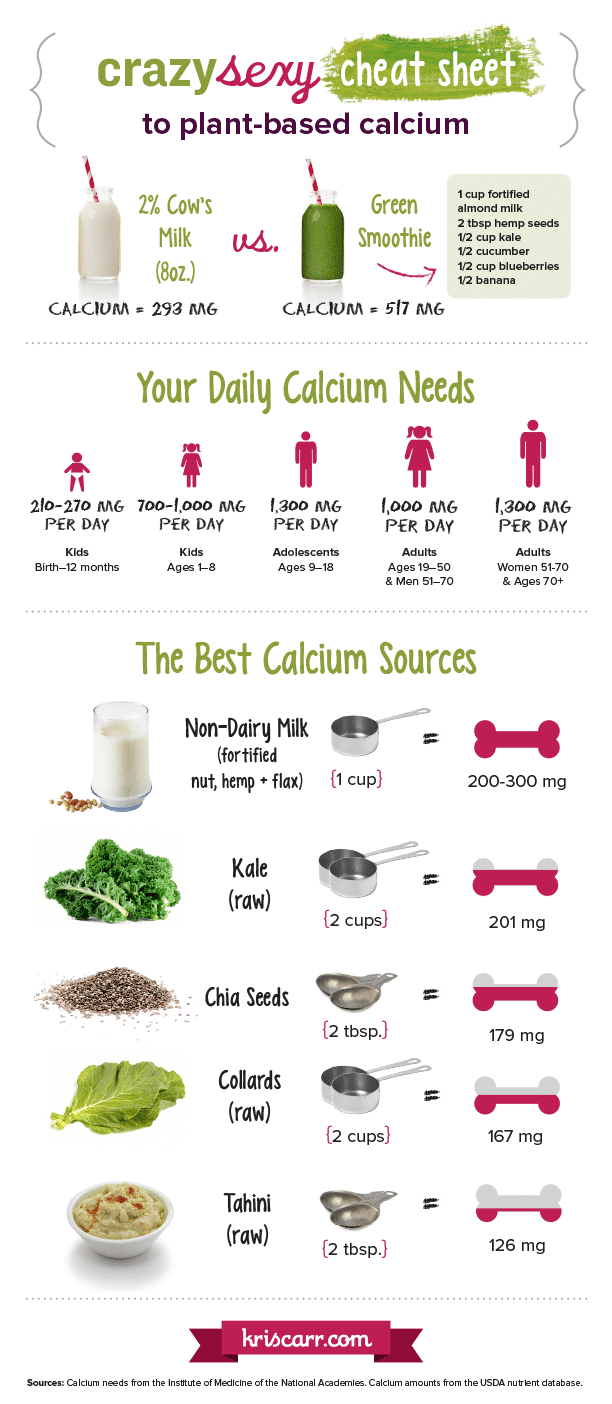
Dairy Free Alternatives
Going dairy-free doesn’t mean deprivation, it just means trying new things! Nowadays there are so many options that are just as good as the “real” deal. To learn about my favorite store-bought dairy alternatives, take a peek at my pantry and fridge. But when you get down to it, the real magic happens in the kitchen. Did you know that you can make your own moo-less cheeses, creams, milks and spreads at home? Plant-based, whole food recipes are easy and way healthier than the store bought stuff. And since I want you to taste this dairy-free goodness pronto, I’ve included some of my go-to Crazy Sexy Kitchen recipes for your enjoyment!
Dairy Free Diet Recipes
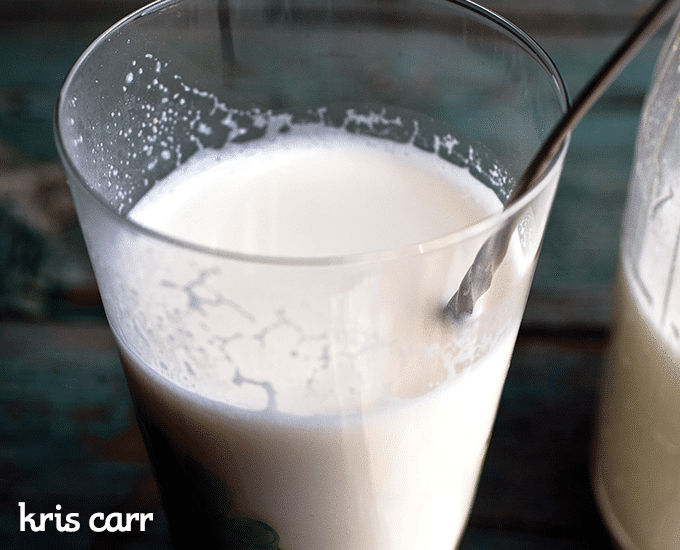
Basic Nut/Seed Milk (Crazy Sexy Kitchen)
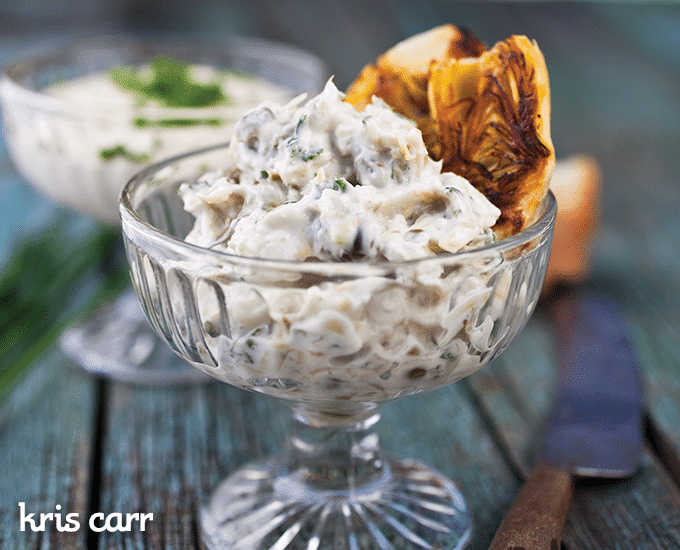
Artichoke Aioli (Crazy Sexy Kitchen)
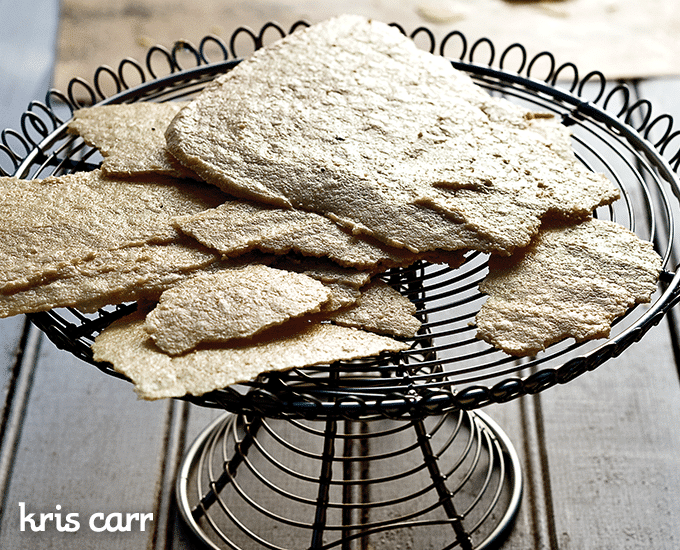
Truffled Parmesan (Crazy Sexy Kitchen)
Oooh, one last tip… Remember that most store bought alternatives are processed, so eat them in moderation or just use them as transition foods till your palate shifts. Also, when choosing these products, look for carrageenan-free, check out this comprehensive list.)
I hope this helps and as always, you don’t have to change everything at once. Slow and steady wins the race. But if you’re dealing with any inflammatory issues, this one recommendation may be the best place to start!
Now it’s your turn, have you seen a change in your overall health after removing dairy from your diet? What are your favorite dairy alternatives?
Peace & nut cheese,
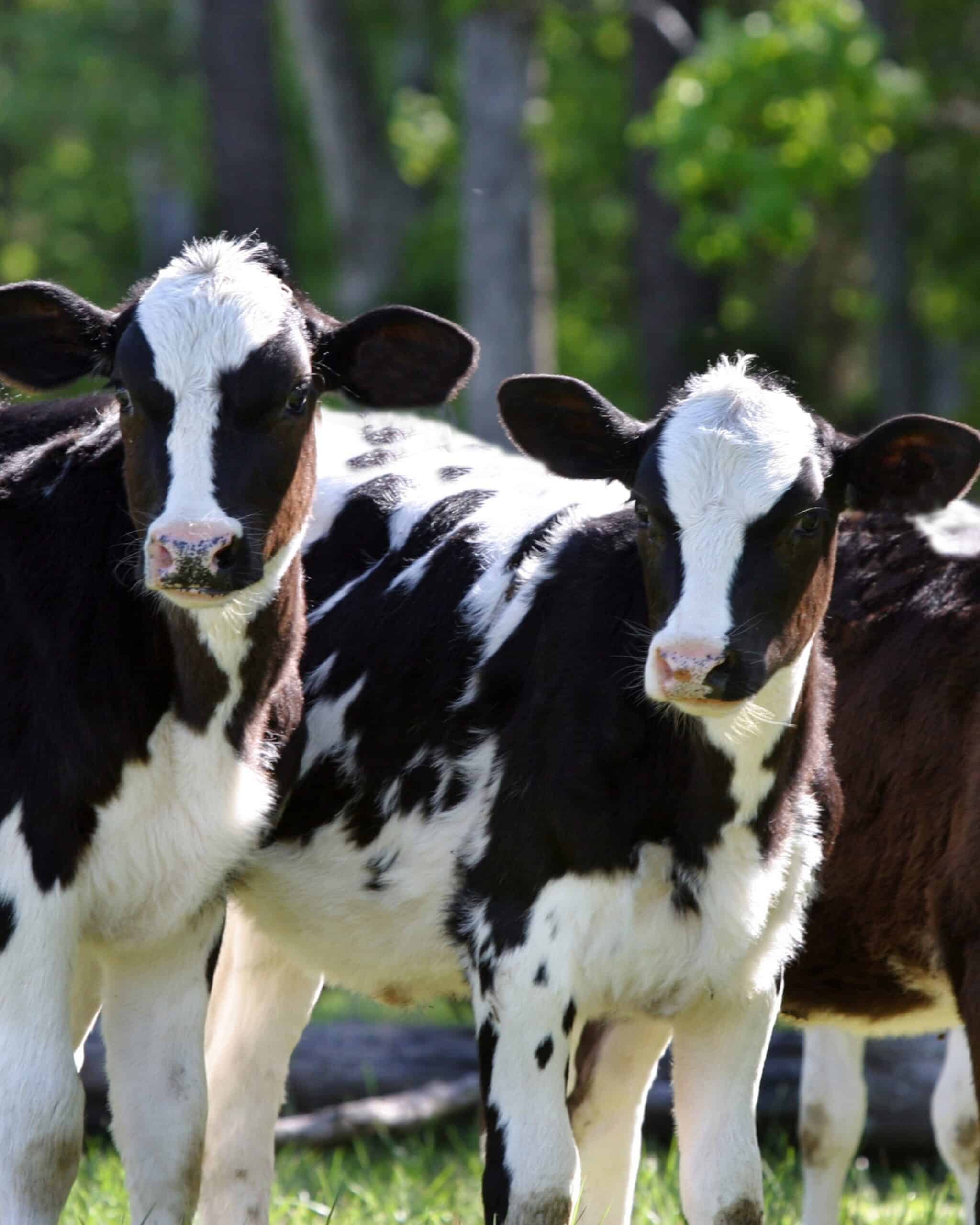


I gave up dairy last August after reading Crazy Sexy Diet. I’ve been vegetarian for about 16 years, but always thought ‘vegan’ would just be way too hard. I really did LOVE my cheese and ice cream. But after I randomly had a stroke at 35 and nearly died, I decided to do whatever it took to NEVER be in a hospital ever again! Five weeks was well over my lifetime quota! Prevention was the new goal – but still, going dairy free was more of a good idea theoretically than practically.
It wasn’t until I started juicing that I was able to make the switch. I slowly changed to a dairy free butter, ice cream and just kept up my juicing. (Coco Pear Juice is my daily rocket fuel!) I think once the ph balance in my body began to change through drinking high alkaline veggies, all of the sudden, anything acidic lost its hold on me and it didn’t even sound or taste good! Dairy, sugar cravings, gone. Like magic.
So if you want to cut it out, just get more alkaline and let nature do the rest!
A couple months after I made the transition, I went to Malta for a week on vacation. (FYI- NOT a vegan friendly country!) No juice bars, hardly any veggies if any on any menus and one menu even had horse meat in addition to the normal staple of rabbit meat (the horror!). I broke down and had a pizza just to see how I’d do and I was so hungry! What happened as a result? Well, I had several zits the next day and I didn’t go to the bathroom for like 3 days. OMG! After that, I don’t even feel the urge. Even a slight accidental slip up still results in a nice little ‘thank you zit.’
I don’t know how I ever called myself a vegetarian before…. But now, I can honestly say I feel better than ever and more than that, I have more mental clarity than ever, no more brain fog!
Thank you, Kris, for helping me take ‘healthy’ to a whole new level!!! 🙂
Would goat milk and sheep cheeses be an alternative?
I’ve been vegan since 2011. I’m also allergic to soy and tree nuts. I mainly use fortified rice milk (carrageenan free). I’ve tried homemade non dairy milks, but like the store bought better. I looked at your recipe. What’s your favorite soy and tree nut -free milk recipe?
thank you kris. While i am familiar with all of this, your blog post put it all together in a concise easy to understand format that i could forward to my husband and kids who struggle unwilling to get off dairy, and to my father in law who indeed has passed kidney stones and is living with some cancer right now. So you have my heartfelt gratitude today and really every day for being on this mission you are on. keep on truckin’ sista.
I really enjoyed this blog post! One thing that I noticed almost right away was that my skin wasn’t breaking out anymore! I used to own every acne fighting cream there was but once I stopped dairy it cleared up. Longterm, I noticed I wasn’t getting ear infections and my sinuses were much clearer.
Kris,
YOU are a joyful and generous teacher. Thank you. LOVE your blog, videos, etc.
I gave up dairy a decade or so ago and never looked back!
I have to say that I haven´t noticed any difference in my health when I removed dairy from my daily diet. But for me, that is not the most important, it´s more important that I show by not choosing animalproducts, that I don´t support that industry it has become.
When I read about how we treat cows and calves I couldn´t stop cry. I felt so bad.
So I think it´s great that I have found products that works fine those times I want dairyproducts.
As “milk” I use fortified oatmilk, unsweetened almondmilk ( when I don´t make it myself ) and Organic soymilk. I have also found a kind of veg, cheese I use from time to time and as cream I use oatcream.
I used to eat a lot of cottage cheese earlier, but I don´t miss that very much. Then I thought that was a good “in between meal” together with fruit.
I also like yoghurt very much, but I think “oatgurt” or soy yoghurt work just fine as well. I don´t eat it on daily bases, but I´m a müslifan for breakfast and then I use these kind of yoghurts, about 2-3 times a week.
Thanks Kris for your lovely inspiration and everything I have learned from you <3
/ Madelaine in Sweden
Omg….this just makes me want to cry! I can live without dairy, except for milk in my coffee. Almond milk tastes evil (and I love almond milk). You have these awesomely roasted beans, ground up perfectly in the machine, fantastic aroma wafting around you, deliciously mixed with the milk….and the milk is bad for you! I can’t live without coffee!
We use So Delicious coconut milk creamer in our coffee, and it’s lovely. You might want to give it a try!
My whole life changed when I gave up dairy and meat 7 months ago! I needed a “little” push which was being diagnosed with breast cancer at only 30 years old!
Raw lifestyle has completely changed my mind, body and soul. My immune system has NEVER been better & I am feeling FANTASTIC! As they say… Cancer is your friend! It makes you re evaluate EVERYTHING! Keep up the great work Kris. ♡
I gave up cow beef and milk- everything produced by a cow, two years ago. I have never felt better. However, I do eat Goat cheese and I use goat milk minimally in my coffee. Do goat milk or goat products produce the same effects as cow even though I have no outward symptoms? Just wondering if you think it would be good to eliminate that as well. Comments?
Love this Kris! Question – do you consider goat’s milk/cheese dairy as well?
Much love!
xoHeather
Whenever I need a “yogurt treat” I eat coconut milk yogurt! Dairy free and super yummy.
Loved this article!! It will be wonderful to pass along to friends and family that question my reasonings to remove my 10 year old son and I from all dairy. He was ‘diagnosed’ with ADD and ADHD through a few tests but the next test, an igG4 blood and urine test determined he was highly allergic to dairy and a few of it’s by-products. He had eczema under his eyes of all places that wouldn’t go away no matter what cream or remedy I tried. Within 8 weeks of removing dairy from his diet, I had a DIFFERENT child. A compassionate, eczema free, gut symptom free, more lively and more on task child. Two years later and all ADD, ADHD symptoms have gone, I credit our raw, organic, gluten free diet to this! Praying for you and your lungs to be healed!!!
How do you view protein shakes with why protein. Since that is a dairy product, do you see it the same way? Just curious if you feel or have research to show that they cause inflammation. Thanks!
i SAW the recipe for nut milk, but how do you fortify it with calcium?
I gave up Dairy right after the New Year. Best thing I ever did. I had seriously cut back in the last 2 years, but I still had 2 spots that were inflammed on my thumb joints that wouldn’t go away unless I took ibuprofen. The reduction in my pain level has been amazing, one hand nothing, and the other hand is barely perceptible. The joints were inflamed, I could feel the heat. I’ve found substitutes for dairy milk with almond milk and hemp milk. Although, I have to say it didn’t do anything for my psoriasis. If anyone has any ideas for treating that with something other than steroids, I would love to hear about it. Some of the medications advertised on TV for psoriasis have some very serious side effects….one of them actually says “death may occur.” Sign me up? Yeah, hello.
Thank you for this eye-opener. I wonder if yogurt, specifically the plain one with probiotics is also bad? I have stopped taking milk, bit ‘am confused about the effects of non sweet home made yogurt. Could you please comment on this?
Thanks,
Suja
Hi Kris
I agree with you in the article but wondered if cultured milk eg kefir, homemade yoghurt, would have the same effect as ordinary milk. If possible I would always use raw milk in those items.
BTW I have just received your Crazy Sexy Diet book and am really enjoying it.
Hi, Kris
I just read this articles and I think it is very interesting. It is about the acid-alkaline diet. Take a look if you have time.
http://chriskresser.com/the-ph-myth-part-1
Thanks for this. We have heard that cow dairy products are hard to digest, you reiterated that. We did learn that Goat is 1000x easier on the system, but I don’t have any science to link to – can you comment? We eat small amount of raw goat cheese, a few tablespoons of goat yogurt that’s been in a yogurt press to make it like ‘cheese’. And @FoodBabe suggests that if we eat butter from Organic Valley, grass-fed cows, we are ok. So, love to hear your take.